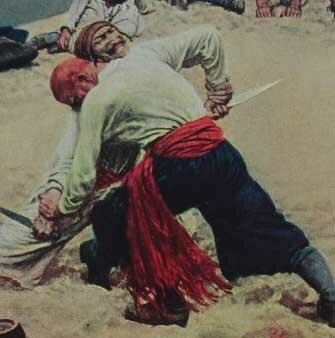Much is written on the democratic society of pirates. This is probably one of the most touted aspects of the pirate life. According to the legend, all members of the crew had a say in where the ship sailed, who they attacked and division of spoils. These often repeated facts have been handed down since the publication of A General History of Piracy in 1724. Surprisingly, while there is evidence that this was the case on some pirate ships, it was not always the case and is more myth than reality. most of the evidence suggesting it occurred can be traced back to a few suspect sources. In reality, the so called pirate democracy was more likely a loose confederation of like minded individuals. The confederation would expand when local governments were weak or corrupt and would dissipate or disappear entirely when weak governments were supported by a Strong European navy or when corrupt officials were routed out and replaced by honest officials with strong military backing.
There were indeed islands in the Caribbean such as Tortuga and later New Providence, Bahamas where pirate communities lived and flourished for short periods of time, often existing in some semblance of democracy. There were also pirate ships that had drawn up articles creating a division of power between the Captain and Quartermaster. While many people would like to believe that pirates existed in some type of utopian democracy, it is doubtful this was the case.
Evidence suggests that many pirate crews had some type of ship's articles that all members of the crew had to sign. In many of these articles, divisions of power are discussed. It is difficult to say how effective these divisions of power were. We also do not have the Articles for some of the most famous pirates to sail the seas. For instance, the Articles of Blackbeard and Roberts have never been found.
While some crews talk of equality and allowed former African slaves to join and fight with the crew. Other pirate ships saw African slaves as a commodity to be sold and still others allowed Africans to work on their ship but used them as slaves. Thus equality among pirates was not always that equal.
If a captain were to recruit men to go on the account, it is doubtful he would then turn over command to one of the men he just recruited. In some instances, a pirate crew may have been a natural leader and members of his family or close friends. In such a case, the democracy would be more like a family or clan, where important decisions are made as a group but the one person, perhaps the oldest, most charismatic, or the smartest would be the leader by default. In such a case, outsiders may not even be recruited and Articles would be unnecessary.
It is more likely that as captains attained more success and attained larger ships and larger crews, then ship's articles would come into play. In such cases, the new men would go through a probation period to make sure they were worthy of a share. If they were, then they would be invited to join and be given articles to sign. This would be a legal contract similar to a job contract.
In cases where captains and quartermasters were chosen by vote, it may be that in a very close vote, the captain would get the majority vote while the quartermaster would be the runner up. A crew might do this to make sure the minority portion of the crew is still represented. it may also do this because it would build a rivalry between the Captain and the Quartermaster, thus causing a built in check and balance. This of course was not always the case, because quite often the vote for captain was unanimous.
In the end, pirate law and government really came down to two elemental truths. The first is the old adage "Swing on, swing all" That is, if you're going to join us, then you'll be hanging with us. And "no prey, no pay". We only get money if we manage to rob a ship. As for democratic societies, detailed ship's articles, and divisions of power — sometimes it happened and sometimes it didn't. Pirate society and ship's articles are as much myth as they are truth.
In short pirate strongholds were more of confederation of thieves where a few strong men probably held the power and acted as de-facto leaders; more similar to a crime family than a true democracy. Aboard ship, a pirate captain and his officers were probably more willing to listen to the redress of the crew because, unlike a Navy or merchant ship, the captain could not rely support or the threat of punishment from a higher authority to back up his command.
The most touted pirate democracy were those in Tortuga and the Bahamas. Tortuga fell after repeated efforts of Spain and unofficial support from corrupt French and British officials dried up. The pirates in the Bahamas were driven into submission by Woodes Rogers. The other much touted Pirate utopia was the fabled Libertalia in Madagascar which has little historical evidence of ever existing. Port Royal was really a Buccaneer Republic and was more or less a sanctioned to wage war against Spain by England and as such really doesn't meet the qualification as a pirate democracy.
Picking the New Captain

What if the old captain wasn't inclined to be deposed by vote and what ifthe crew was split in their dissatisfaction with the current captain? Perhaps a duel to the death could settle the matter.
Or perhaps the old captain was killed and his first mate has made his claim to the position based on his positron but the quartermaster has challenged his right. A duel may determine the new captain but would it satisfy the crew?
Duels to determine the new captain are more Hollywood than fact. Duels among the leaders could cause a split among the crews loyalties.
However, a captain may allow members of his crew to go ashore and duel to the death in order to settle a personal grudge. By doing so, the captain no longer is responsible for the justice that will be served.

The only author and editor of all pages on the site. Most of what I write about is based on years of book reading on the topic. My first web page was published back in 1994.